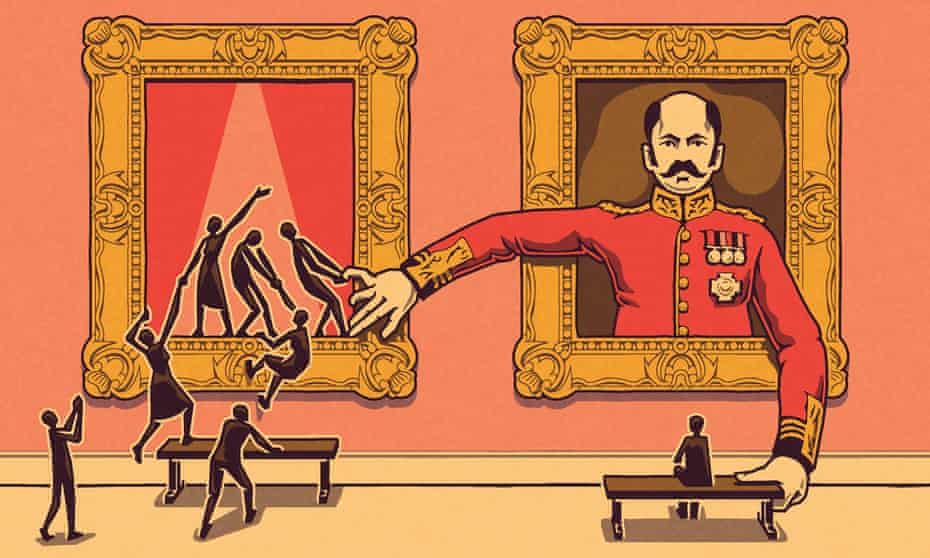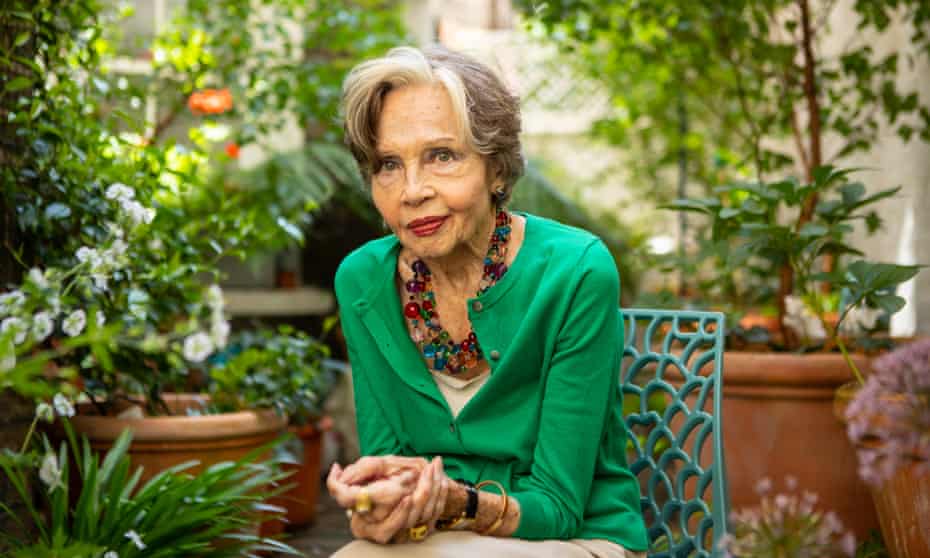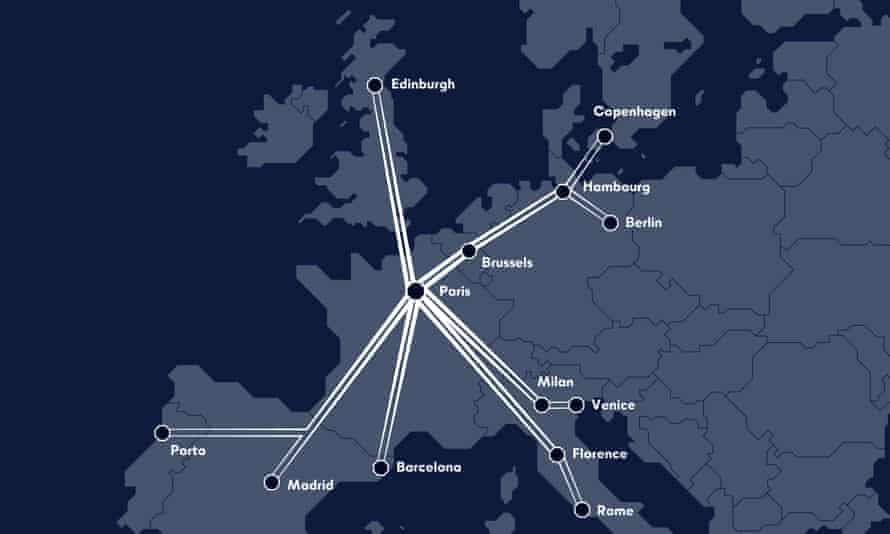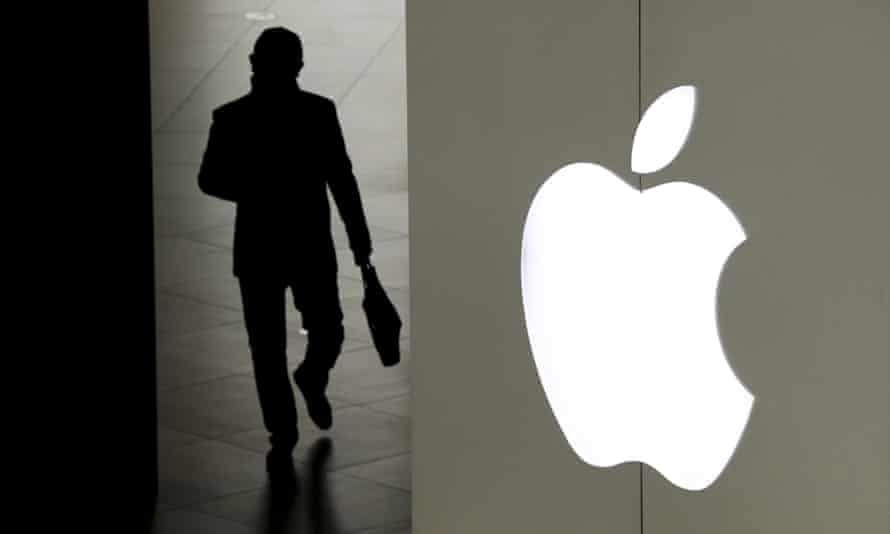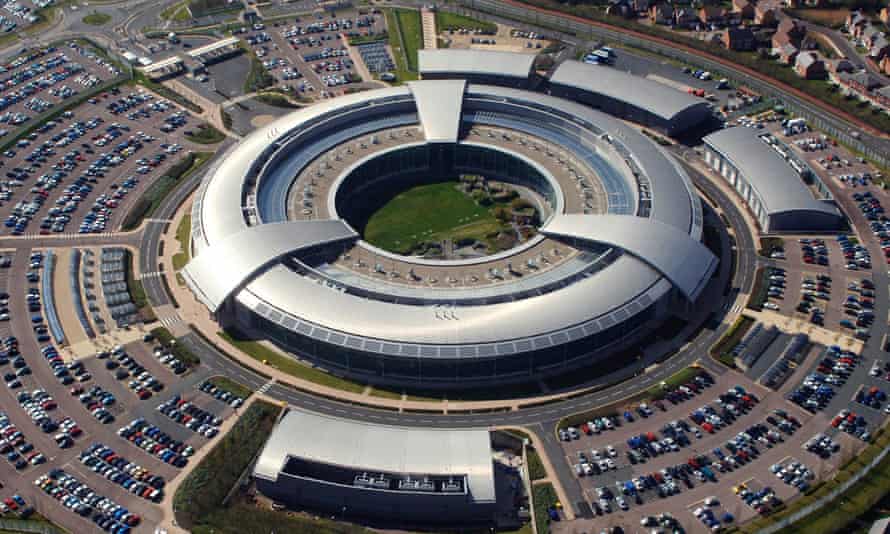Singapore is turning into a dystopian surveillance state
Well, this is concerning. Especially given governments' love for authoritarian technologies and copying one another’s surveillance practices.
Singapore has trialled patrol robots that blast warnings at people engaging in “undesirable social behaviour”, adding to an arsenal of surveillance technology in the tightly controlled city-state that is fuelling privacy concerns.Source: ‘Dystopian world’: Singapore patrol robots stoke fears of surveillance state | Singapore | The GuardianFrom vast numbers of CCTV cameras to trials of lampposts kitted out with facial recognition tech, Singapore is seeing an explosion of tools to track its inhabitants.
[…]
The government’s latest surveillance devices are robots on wheels, with seven cameras, that issue warnings to the public and detect “undesirable social behaviour”.
This includes smoking in prohibited areas, improperly parking bicycles, and breaching coronavirus social-distancing rules.
During a recent patrol, one of the “Xavier” robots wove its way through a housing estate and stopped in front of a group of elderly residents watching a chess match.
“Please keep one-metre distancing, please keep to five persons per group,” a robotic voice blared out, as a camera on top of the machine trained its gaze on them.
Culture is in a state of constant flux
My parents, the son of a factory worker and assistant baker and the daughter of domestic servants, were both the first in their families to go to university. As such, they wanted to ensure that their children, my sister and I, knew our way around ‘culture’.
Hence, for me, a childhood punctuated not only piano lessons and visits to National Trust properties but visits to the cheapest seats at the theatre to see ballets and plays. In their mind, at least back then, there was ‘Culture’ (with a capital ‘C’) to which we had to be introduced.
As Kojo Koram from the School of Law at Birkbeck, University of London, writes, however, culture is something that is continually remade by the people living it. These different conceptions mark the boundaries of the culture wars currently being played out in British politics and society.
In the 1960s and 70s, when [Stuart] Hall was writing, most British intellectuals dismissed the new mass culture taking hold in the country as a passing fad that did not deserve the attention given to Shakespeare, Elgar or Hogarth. But Hall recognised how it offered an increasingly multicultural British population the opportunity to interpret and experience life as it was lived on the ground. Rather than seeing culture as something fixed and unchanging that needed constant protection, Hall saw it as something that underwent “constant transformation” and was always being made and remade by the people living it, a moving force that perpetually created new identities.Source: Here’s what the right gets wrong about culture: it’s not a monument, but a living thing | The GuardianIt is no coincidence that so many of the primary battlegrounds where today’s culture wars are being staged are the elite institutions that represent a traditional British hierarchy: stately homes, Oxford university common rooms, the Last Night of the Proms. To culture warriors on the right, these institutions best represent Britain’s national culture as a whole. That they are exclusive is part of their appeal: when culture is defined as something that only a few people can access or control, its preservation is best entrusted to high-ranking authorities.
Leslie Caron on Cary Grant's attitude to money
I read most things online, but I came across this one via my print subscription to Guardian Weekly (which I recommend highly). Leslie Caron, who danced and acted with a host of big names, highlights Cary Grant’s attitude towards money.
I’ve always found Cary Grant fascinating, and in fact my online avatar used to be a photo of him. It seems, as Leslie Caron points out, that one’s mindset can be out of step with reality — which is a lesson to us all.
Who was her most talented leading man? “Cary Grant,” she answers immediately. In 1964, she starred with Grant in the romcom Father Goose; Grant was 27 years her senior. “Cary was a complicated brain,” she says, pointing to her head. “He was a remarkable performer. He was very instinctive, seductive, intelligent. But when he got mad he would get into a terrible state. He worried about money.” Surely he had plenty of it? Yes, she says, but when you grow up poor you always think like a poor person. “I remember Charlie Chaplin saying to me: ‘If I were rich …’” When Chaplin died in 1977, he left more than $100m to his fourth wife, Oona.Source: ‘I am very shy. It’s amazing I became a movie star’: Leslie Caron at 90 on love, art and addiction | The Guardian
The most sustainable foods?
I’m surprised at this list from The Guardian, which includes red meat. As of February, I don’t eat fish (or shellfish) so mussels are off the list for me as well.
What is important, I think, is the bit at the bottom about waste food. I’ve started putting coffee grounds on the garden, and that banana skin curry sounds… interesting!
If, as a planet, we stopped wasting food altogether, we’d eliminate 8% of our total emissions – so one easy way to eat for the planet would be to tackle that, Steel points out. That could be through preserving and making stock from meat and fish bones – but it could also be as simple as eating as much of a fruit or vegetable as possible. “The skin, the seeds, the leaves – these are where the phytonutrients are,” she says, citing Nigella’s banana skin curry as an example. Supporting companies which are repurposing waste – surplus bread into beer, surplus fruit into condiments and chutneys – is another easy win.Source: Eat this to save the world! The most sustainable foods – from seaweed to venison | The Guardian
New network of sleeper trains
Team Belshaw went inter-railing a few summers ago, which included a sleeper train from Switzerland to Slovenia, and it was fantastic.
In a time when we’ll certainly be looking to fly less, this is great news.
Midnight Trains is hoping post-Covid interest in cleaner, greener travel will generate interest in its proposed “hotels on rails”, which aims to connect the French capital to 12 other European destinations, including Edinburgh.Source: New network of European sleeper trains planned | Rail travel | The GuardianThe founders say the aim is not to match the famous – and expensive – luxury of the Orient Express but offer an alternative to the basic, state-run SNCF sleepers and short-haul flights.
Key to the service will be “hotel-style” rooms offering privacy and security, and an onboard restaurant and bar.
Anxiety and performance
I’ve recently had to re-evaluate my life and realise that, while there are others who see me as a confident, middle-aged man, that narrative doesn’t bear any kind of scrutiny. Instead, it’s liberating to realise that there is a kind of anxiety which is a two-edged sword; it can propel you forwards and hold you back, depending on how you treat it.
I’d assumed, in my simple two-plus-two way, that people who choose jobs like this found it easy, even enjoyed the thrill. I’m heartened to discover that they, too, feel frightened, their confidence an illusion. And I’m delighted that the shame associated with nervousness, a trait we’re expected to grow out of, has subsided enough for it to be discussed so openly. It’s no coincidence stage fright and its shivering sisters are being talked about now, at a time when even the most confident-seeming people are feeling nervous about re-entering the world.Source: Feeling nervous isn’t bad – it happens to us all | Life and style | The GuardianThe pandemic has helped clarify concepts that previously felt abstract. “Nervousness”, we see now, is not just a childish affectation but a rational reaction to situations that feel dangerous, a feeling experienced by many, and often. Similarly, we are being forced to reconsider the idea of “hope”. Rather than a simple heart-fluttering optimism, hope has been revealed to be both necessary and a bit of a slog. A decision, made daily upon waking, to seek out good news and drag ourselves towards it using our nails, our knees, whatever clawed instrument we have to hand. It prevents us from sinking so deep into the porridge of modern life that we no longer have the energy to look ahead.
Wherefore art thou, privacy?
As John Naughton points out, if Apple are the only Big Tech company truly interested in preserving our privacy, we should be worried.
So here’s where we are: an online system has been running wild for years, generating billions in profits for its participants. We have evidence of its illegitimacy and a powerful law on the statute book that in principle could bring it under control, but which we appear unable to enforce. And the only body that has, to date, been able to exert real control over the aforementioned racket is… a giant private company that itself is subject to serious concerns about its monopolistic behaviour. And the question for today: where is democracy in all this? You only have to ask to know the answer.Source: If Apple is the only organisation capable of defending our privacy, it really is time to worry | John Naughton | The Guardian
GCHQ violates our privacy
Hardly surprising, but it’s important people are still pushing on this eight years(!) after the Snowden revelations. It’s incredible to me how The Guardian and other outlets can reveal this kind of thing along with the financial corruption set out in the Panama Papers and so little changes as a result.
In Tuesday’s ruling, which confirmed elements of a lower court’s 2018 judgment, the judges said they had identified three “fundamental deficiencies” in the regime. They were that bulk interception had been authorised by the secretary of state, and not by a body independent of the executive; that categories of search terms defining the kinds of communications that would become liable for examination had not been included in the application for a warrant; and that search terms linked to an individual (that is to say specific identifiers such as an email address) had not been subject to prior internal authorisation.Source: GCHQ’s mass data interception violated right to privacy, court rules | GCHQ | The Guardian
A candour affected is a dagger concealed

🤯 The Next Decade Could Be Even Worse
📝 White privilege - a guide for parents
👩💻 Working from home could lead to more prejudice, report warns
🎩 The radical aristocrat who put kindness on a scientific footing
Quotation-as-title by Marcus Aurelius. Image from top-linked post.
Much will have more
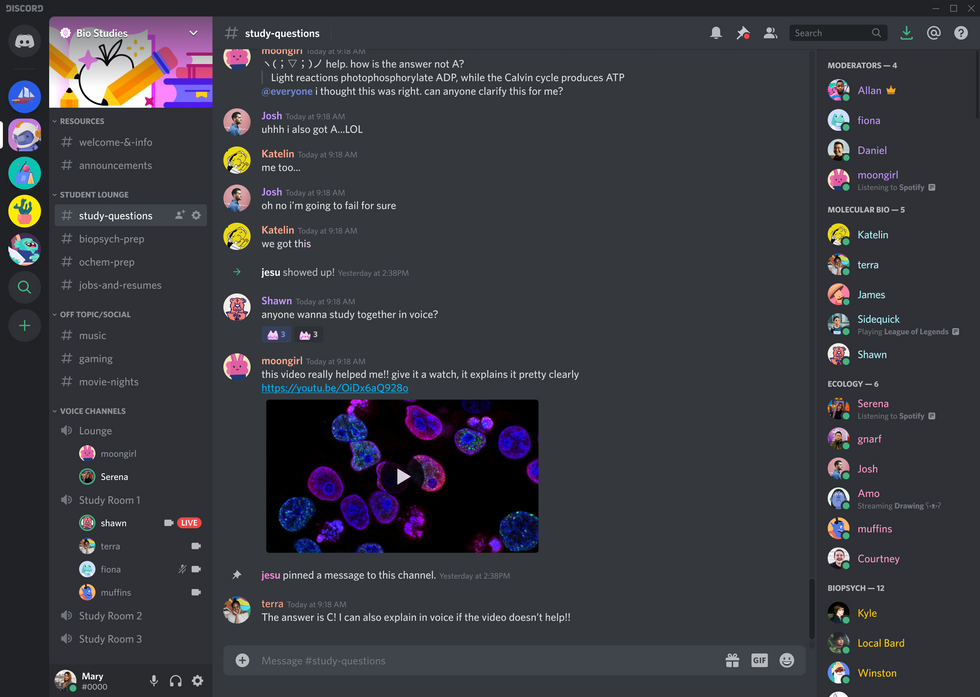
🧠 How Discord (somewhat accidentally) invented the future of the internet
😶 Parler 'free speech' app tops charts in wake of Trump defeat
🤖 'Robot soldiers could make up quarter of British army by 2030s'
🇪🇺 Europe is adopting stricter rules on surveillance tech
🏥 NHS data: Can web creator Sir Tim Berners-Lee fix it?
Quotation-as-title by Ralph Waldo Emerson. Image from top-linked post.
Seeing through is rarely seeing into
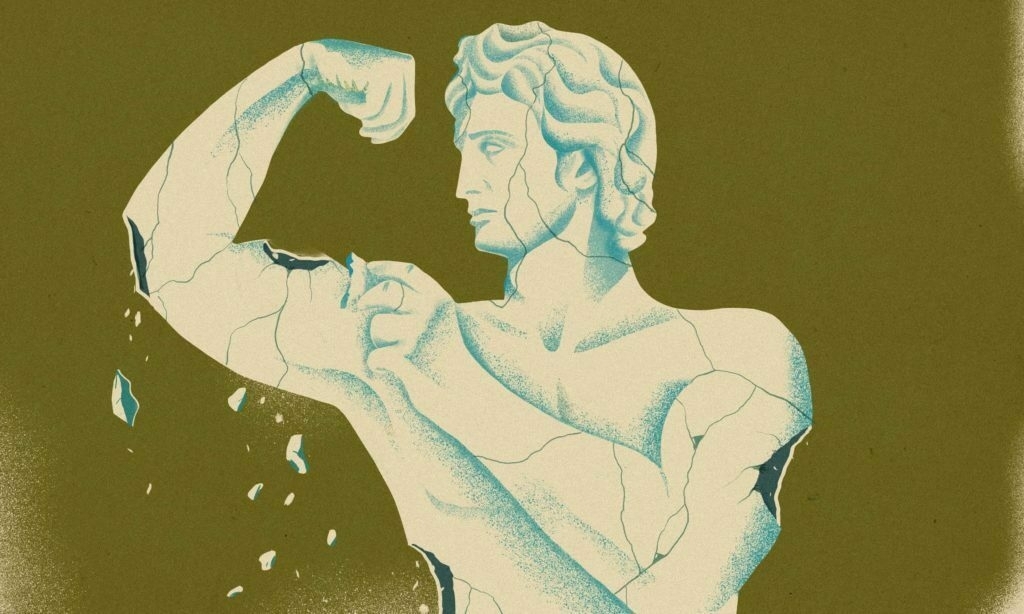
♂️ What does it mean to be a man in 2020? Introducing our news series on masculinity
✏️ Your writing style is costly (Or, a case for using punctuation in Slack)
Quotation-as-title by Elizabeth Bransco. Image from top-linked post.
Reducing exam stress by removing pointless exams
In the UK, it used to be the case that children could leave school at 16. This was the reason for 'O' levels (which my parents took), and GCSEs, which I sat at that age.
However, these days, young people must remain in education or training until they are 18 years old. What, then, is the point of taking exams aged 16 and 18?
A group of Tory MPs has written a report, with one of the authors, Flick Drummond, making some good points:
The paper argues that preparation for GCSE exams means that pupils miss a large chunk of valuable learning because of the time taken up with mock exams and revision, followed by the exams themselves. “That’s almost six months out of a whole year spent preparing for exams,” said Drummond.
She said she was particularly concerned by the impact of exams on mental health, citing a report backed by the Children’s Society in August that ranked England 36th out of 45 countries in Europe and North America for wellbeing.Richard Adams, Tory MPs back ditching GCSE exams in English school system overhaul (The Guardian)
Instead, the new report says, the exams should be replaced by a baccalaureate, which would cover several years’ study and would allow children more time from the age of 15 to settle on the subjects they wanted to study in the sixth form for A-levels or vocational qualifications such as T-levels and apprenticeships, and to explore potential careers in a structured way.
As a parent of children who could be affected by this, I actually think this should be trialled first in the private sector and then rolled out in the state sector. Too often, the private sector benefits from treating state school pupils as guinea pigs, and then cherry-picking what works.
Face-to-face university classes during a pandemic? Why?
Earlier in my career, when I worked for Jisc, I was based at Northumbria University in Newcastle. It's just been announced that 770 students there have been infected with COVID-19.
As Lorna Finlayson, a philosophy lecturer at the University of Essex, points out, the desire to get students on campus for face-to-face teaching is driven by economics. Universities are businesses, and some of them are likely to fail this academic year.
[A]fter years of pushing to expand online learning and “lecture capture” on the basis that it is what students want, university managers have decided that what students really want now, during a global pandemic, is face-to-face contact. This sudden-onset fetish reached its most perverse extreme in the case of Boston University, which, realising that many teaching rooms lack good ventilation or even windows, decided to order “giant air circulators”, only to discover that the air circulators were very noisy. Apparently unable to source enough “mufflers” for the air circulators, the university ordered Bluetooth headsets to enable students and teachers to communicate over the roar of machinery.
All of which raises the question: why? The determination to bring students back to campus at any cost doesn’t stem from a dewy-eyed appreciation of in-person pedagogy, nor from concerns about the impact of isolation on students’ mental health. If university managers had any interest in such things, they would not have spent years cutting back on study skills support and counselling services.
Lorna Finlayson, How universities tricked students into returning to campus (The Guardian)
I know people who work in universities in various positions. What they tell me astounds me; a callous disregard for human life in the pursuit of either economic survival, or profit.
This is, as usual, all about the money. With student fees and rents now their main source of revenue, universities will do anything to recruit and retain. When the pandemic hit, university managers warned of a potentially catastrophic loss of income from international student fees in particular. Many used this as an excuse to cut jobs and freeze pay, even as vice-chancellors and senior management continued to rake in huge salaries. As it turned out, international student admissions reached a record high this year, with domestic undergraduate numbers also up – perhaps less due to the irresistibility of universities’ “offer” than to the lack of other options (needless to say, staff jobs and pay have yet to be reinstated).
Lorna Finlayson, How universities tricked students into returning to campus (The Guardian)
But students are more than just fee-payers. They are rent-payers too. Rightly or wrongly, most of those in charge of universities have assumed that only the promise of face-to-face classes would tempt students back to their accommodation. That promise can be safely broken only once rental contracts are signed and income streams flowing.
I predict legal action at some point in the near future.
The discourse of disruption
Adrian Daub, a professor of literature, takes issue with the tech sector's focus on disruption:
Most of the discourse around disruption clearly draws on the idea of creative destruction, but it shifts it in important respects. It doesn’t seem to suggest that ever-intensifying creative destruction will eventually lead to a new stability – that hyper-capitalism almost inevitably pushes us toward something beyond capitalism. Instead, disruption seems to suggest that the instability that comes with capitalism is all there is and can be – we might as well strap in for the ride. Ultimately, then, disruption is newness for people who are scared of genuine newness. Revolution for people who don’t stand to gain anything by revolution.
Indeed, there is an odd tension in the concept of disruption: it suggests a thorough disrespect towards whatever existed previously, but in truth it often seeks to simply rearrange whatever exists. Disruption is possessed of a deep fealty to whatever is already given. It seeks to make it more efficient, more exciting, more something, but it never ever wants to dispense altogether with what’s out there. This is why its gestures are always radical, but its effects never really upset the apple cart: Uber claims to have “revolutionised” the experience of hailing a cab, but really that experience has largely stayed the same. What it managed to get rid of were steady jobs, unions and anyone other than Uber making money on the whole enterprise.
Adrian Daub, The disruption con: why big tech’s favourite buzzword is nonsense (The Guardian)
Venture-capital backed tech companies providing profits through (what I call) 'software with shareholders' fracture our societies, destroy our communities, and enrich the privileged.
The world needs less philanthropy and more equality
I've been skeptical about the motives of philanthropic organisations for a while now. This article in The Guardian is a long read, but worth it.
Here's an excerpt:
The common assumption that philanthropy automatically results in a redistribution of money is wrong. A lot of elite philanthropy is about elite causes. Rather than making the world a better place, it largely reinforces the world as it is. Philanthropy very often favours the rich – and no one holds philanthropists to account for it.
The role of private philanthropy in international life has increased dramatically in the past two decades. Nearly three-quarters of the world’s 260,000 philanthropy foundations have been established in that time, and between them they control more than $1.5tn. The biggest givers are in the US, and the UK comes second. The scale of this giving is enormous. The Gates Foundation alone gave £5bn in 2018 – more than the foreign aid budget of the vast majority of countries.
Philanthropy is always an expression of power. Giving often depends on the personal whims of super-rich individuals. Sometimes these coincide with the priorities of society, but at other times they contradict or undermine them. Increasingly, questions have begun to be raised about the impact these mega-donations are having upon the priorities of society.
Friday fadings
I'm putting this together quickly before heading off to the Lake District camping with my son for a couple of nights. I'm pretty close to burnout with all of the things that have happened recently, so need some time on top of mountains and under the stars 🏕️
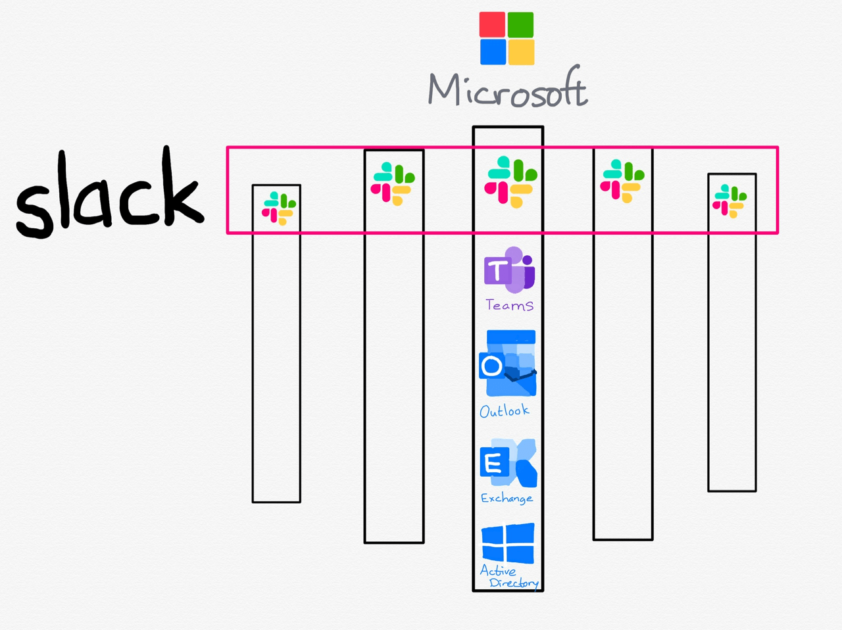
The Slack Social Network
Slack Connect is about more than chat: not only can you have multiple companies in one channel, you can also manage the flow of data between different organizations; to put it another way, while Microsoft is busy building an operating system in the cloud, Slack has decided to build the enterprise social network. Or, to put it in visual terms, Microsoft is a vertical company, and Slack has gone fully horizontal.
Ben Thompson (Stratechery)
The difference between consulting full-time now versus when I last did it in 2017 is that everyone adds you to their Slack workspace. This is simultaneously fantastic and terrible. What's being described here is more on the 'Work OS' stuff I shared in last week's link roundup.
See also Stephen Downes' commentary on mini-apps that perform particular functions inside other apps.
Only 9% of visitors give GDPR consent to be tracked
Advertising funded businesses are aware that the minority of visitors want to give consent.
They are simply riding the ad train and milking the cash cow for as long as they can get away with before GDPR gets enforced and they either shut down, adapt to a more sustainable business model or explore even more privacy invasive practices.
And the alternative to the advertising-funded web? Charge for services. And have your premium subscribers fund the free plans.
Marko Saric
This is interesting, and backs up the findings in this journal article about the 'dark patterns' prevalent around GDPR consent on the web. The author of this post found that only 48% of people clicked on the banner and, as the title states, only 9% of those gave permission to be tracked.

Oak National Academy: lockdown saviour or DfE tool?
There are some who are alarmed by the nature of the creature that the DfE has helped bring to life, seeing Oak as an enterprise established by a narrow strata of figures from DfE-favoured multi-academy trusts; and as a potential vehicle for the department to promote a “traditionalist” agenda in teaching, or even create the subject matter of a government-approved curriculum.
John Morgan (TES)
I welcome this critical article in the TES of Oak National Academy. My two children find the lessons 'cringey', not every subject is covered, and the more you look into it, the more it seems like a front for a pedagogical coup.
The More Senior Your Job Title, the More You Need to Keep a Journal
Journal entries should provide not only a record of what happened but how we reacted emotionally; writing it down brings a certain clarity that puts things in perspective. In other cases, it’s a form of mental rehearsal to prepare for particularly sensitive issues where there’s no one to talk with but yourself. Journals can also be the best way to think through big-bet decisions and test one’s logic.
Dan Ciampa (Harvard Business Review
When I turned 18, I decided to keep a diary of my adult life. After about a decade, that had become a sporadic record of times when things weren't going so well. Now, 21 years later, I merely keep my #HashtagADay journal up-to-date.
But writing things down is really useful, as is having someone to talk to with whom you don't have an emotion-based relationship. After nine sessions of CBT, I wish I'd had someone like my therapist to talk to at a much younger age. Not because I'm 'broken' but because I'm human.

Top 10 books about tumultuous times
There’s nothing like a crisis of survival to show people’s true natures. Though I’ve written a good deal about tumultuous times, both fiction (English Passengers) and non-fiction (Rome: a History in Seven Sackings), I can’t say I’m too interested in the tumult itself. I’m more interested in the decisions people make during such crises – how they ride the wave.
Matthew Kneale (THe GUardian)
I don't think I'd heard of any of these books before reading this article! That being said, I've just joined Verso's new Book Club so my backlog just got a lot longer...
Full Employment
Keynes once proposed that we could jump-start an economy by paying half the unemployed people to dig holes and the other half to fill them in.
No one’s really tried that experiment, but we did just spend 150 years subsidizing our ancestors to dig hydrocarbons out of the ground. Now we’ll spend 200-300 years subsidizing our descendants to put them back in there.
Cory Doctorow (Locus Online)
I've quoted the end of this fantastic article, but you should read the whole thing. Doctorow, in his own inimitable way, absolutely eviscerates the prediction that a 'General Artificial Intelligence' will destroy most jobs.
Header image by Patrick Hendry
Using WhatsApp is a (poor) choice that you make
People often ask me about my stance on Facebook products. They can understand that I don't use Facebook itself, but what about Instagram? And surely I use WhatsApp? Nope.
Given that I don't usually have a single place to point people who want to read about the problems with WhatsApp, I thought I'd create one.
WhatsApp is a messaging app that was acquired by Facebook for the eye-watering amount of $19 billion in 2014. Interestingly, a BuzzFeed News article from 2018 cites documents confidential documents from the time leading up to the acquisition that were acquired by the UK's Department for Culture, Media, and Sport. They show the threat WhatsApp posed to Facebook at the time.
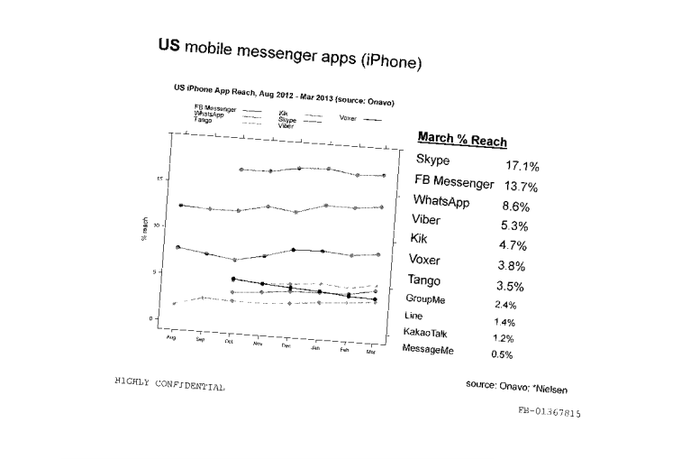
As you can see from the above chart, Facebook executives were shown in 2013 that WhatsApp (8.6% reach) was growing rapidly and posed a huge threat to Facebook Messenger (13.7% reach).
So Facebook bought WhatsApp. But what did they buy? If, as we're led to believe, WhatsApp is 'end-to-end encrypted' then Facebook don't have access to the messages of users. So what's so valuable?
Brian Acton, one of the founders of WhatsApp (and a man who got very rich through its sale) has gone on record saying that he feels like he sold his users' privacy to Facebook.
Facebook, Acton says, had decided to pursue two ways of making money from WhatsApp. First, by showing targeted ads in WhatsApp’s new Status feature, which Acton felt broke a social compact with its users. “Targeted advertising is what makes me unhappy,” he says. His motto at WhatsApp had been “No ads, no games, no gimmicks”—a direct contrast with a parent company that derived 98% of its revenue from advertising. Another motto had been “Take the time to get it right,” a stark contrast to “Move fast and break things.”
Facebook also wanted to sell businesses tools to chat with WhatsApp users. Once businesses were on board, Facebook hoped to sell them analytics tools, too. The challenge was WhatsApp’s watertight end-to-end encryption, which stopped both WhatsApp and Facebook from reading messages. While Facebook didn’t plan to break the encryption, Acton says, its managers did question and “probe” ways to offer businesses analytical insights on WhatsApp users in an encrypted environment.
Parmy Olson (Forbes)
The other way Facebook wanted to make money was to sell tools to businesses allowing them to chat with WhatsApp users. These tools would also give "analytical insights" on how users interacted with WhatsApp.
Facebook was allowed to acquire WhatsApp (and Instagram) despite fears around monopolistic practices. This was because they made a promise not to combine data from various platforms. But, guess what happened next?
In 2014, Facebook bought WhatsApp for $19b, and promised users that it wouldn't harvest their data and mix it with the surveillance troves it got from Facebook and Instagram. It lied. Years later, Facebook mixes data from all of its properties, mining it for data that ultimately helps advertisers, political campaigns and fraudsters find prospects for whatever they're peddling. Today, Facebook is in the process of acquiring Giphy, and while Giphy currently doesn’t track users when they embed GIFs in messages, Facebook could start doing that anytime.
Cory Doctorow (EFF)
So Facebook is harvesting metadata from its various platforms, tracking people around the web (even if they don't have an account), and buying up data about offline activities.
All of this creates a profile. So yes, because of end-ot-end encryption, Facebook might not know the exact details of your messages. But they know that you've started messaging a particular user account around midnight every night. They know that you've started interacting with a bunch of stuff around anxiety. They know how the people you message most tend to vote.
Do I have to connect the dots here? This is a company that sells targeted adverts, the kind of adverts that can influence the outcome of elections. Of course, Facebook will never admit that its platforms are the problem, it's always the responsibility of the user to be 'vigilant'.
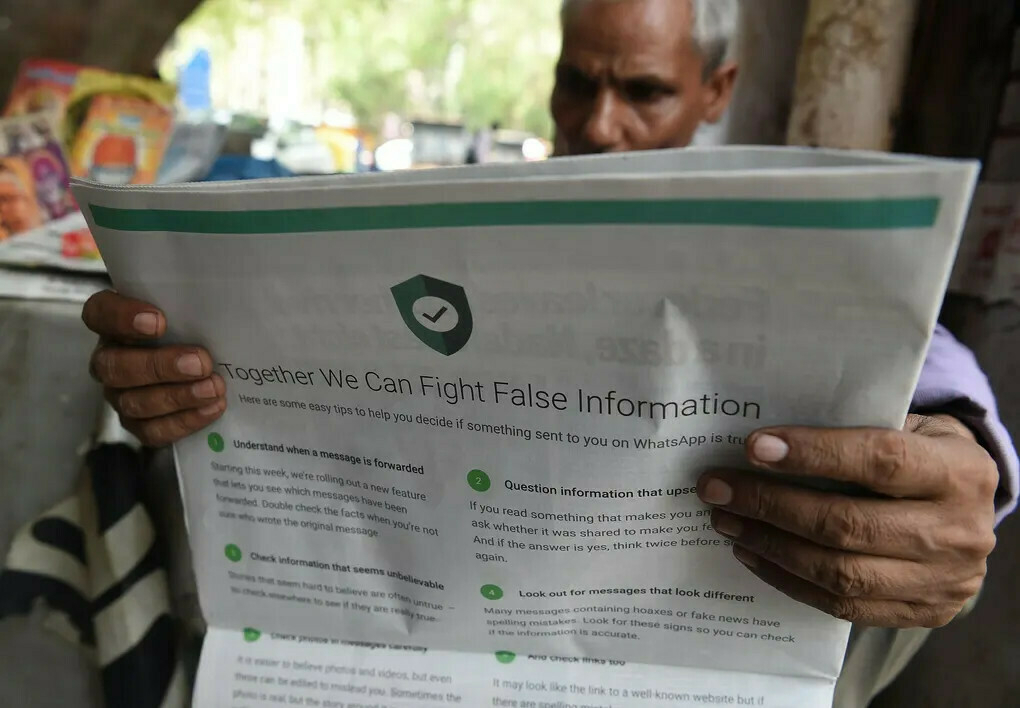
So you might think that you're just messaging your friend or colleague on a platform that 'everyone' uses. But your decision to go with the flow has consequences. It has implications for democracy. It has implications on creating a de facto monopoly for our digital information. And it has implications around the dissemination of false information.
The features that would later allow WhatsApp to become a conduit for conspiracy theory and political conflict were ones never integral to SMS, and have more in common with email: the creation of groups and the ability to forward messages. The ability to forward messages from one group to another – recently limited in response to Covid-19-related misinformation – makes for a potent informational weapon. Groups were initially limited in size to 100 people, but this was later increased to 256. That’s small enough to feel exclusive, but if 256 people forward a message on to another 256 people, 65,536 will have received it.
[...]
A communication medium that connects groups of up to 256 people, without any public visibility, operating via the phones in their pockets, is by its very nature, well-suited to supporting secrecy. Obviously not every group chat counts as a “conspiracy”. But it makes the question of how society coheres, who is associated with whom, into a matter of speculation – something that involves a trace of conspiracy theory. In that sense, WhatsApp is not just a channel for the circulation of conspiracy theories, but offers content for them as well. The medium is the message.
William Davies (The Guardian)
I cannot control the decisions others make, nor have I forced my opinions on my two children, who (despite my warnings) both use WhatsApp to message their friends. But, for me, the risk to myself and society of using WhatsApp is not one I'm happy with taking.
Just don't say I didn't warn you.
Header image by Rachit Tank
Saturday scrapings
Every week, I go back through the links I've saved, pick out the best ones, and share them here. This week is perhaps even more eclectic than usual. Enjoy!
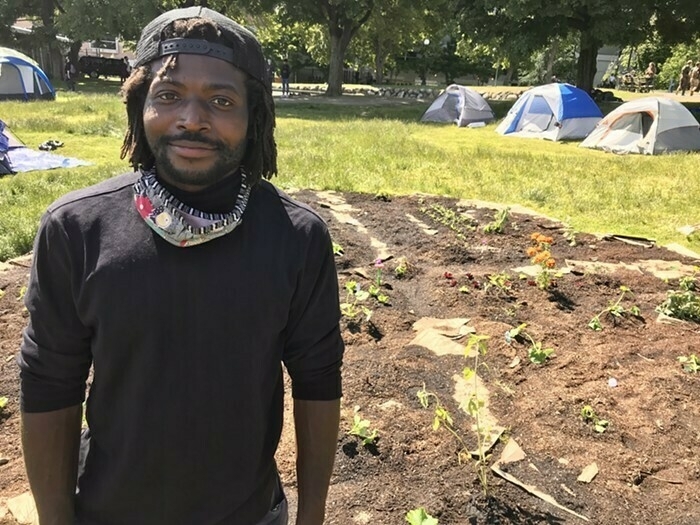
Meet the Farmer Behind CHAZ's Vegetable Gardens
Marcus was the first to start gardening in the park, though he was quickly joined by friends and strangers. This isn’t the work of a casual amateur; Henderson has an Energy Resources Engineering degree from Stanford University, a Master’s degree in Sustainability in the Urban Environment, and years of experience working in sustainable agriculture. His Instagram shows him hard at work on various construction and gardening projects, and he’s done community development at organic farms around the world.
Matt Baume (The Stranger)
I love this short article about Marcus Henderson, the first person to start planting in Seattle's Capitol Hill Autonomous Zone.
The Rich Are 'Defunding' Our Democracy
“Apparently,” comments [journalist David] Sirota, “we’re expected to be horrified by proposals to reduce funding for the militarized police forces that are violently attacking peaceful protesters — but we’re supposed to obediently accept the defunding of the police forces responsible for protecting the population from the wealthy and powerful.”
Sam Pizzigati (Inequality.org)
A lot of people have been shocked by the calls to 'defund the police' on the back of the Black Lives Matter protests. The situation is undoubtedly worse in the US, but I particularly liked this explainer image, that I came across via Mastodon:
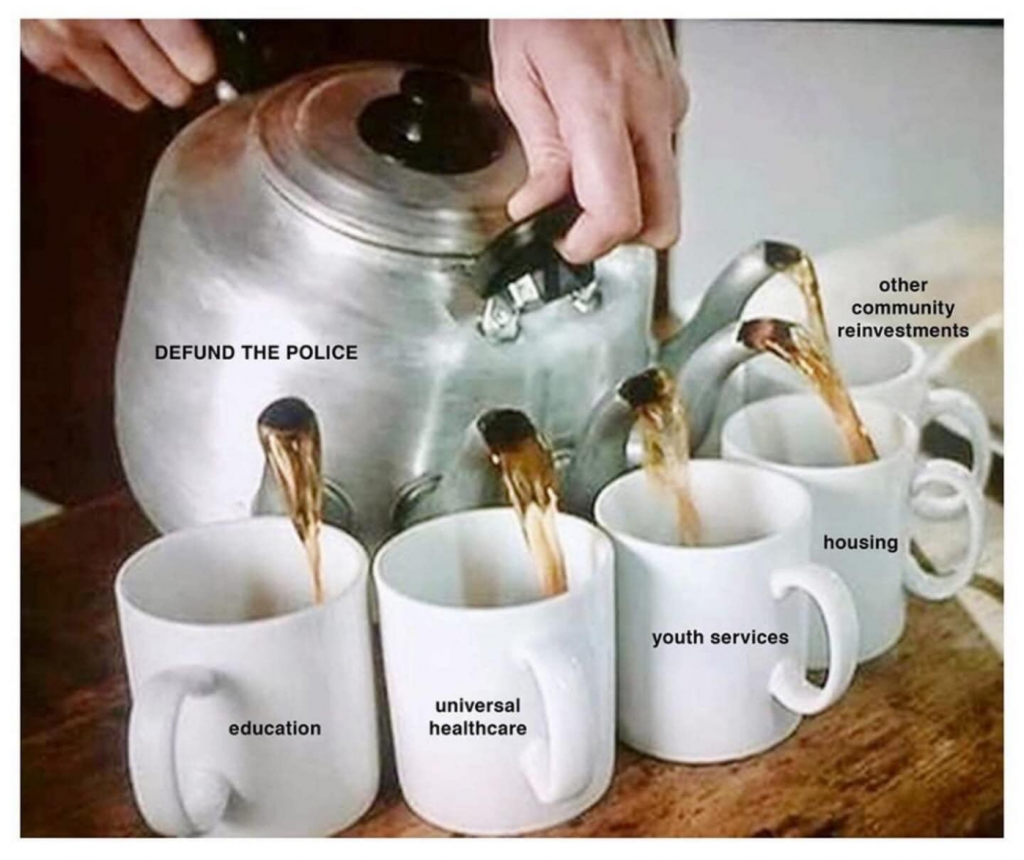
Peasants' Revolt
Yet perhaps the most surprising feature of the revolt is that in-spite of the modern title, Peasants' Revolt didn't gain usage until the late nineteenth century, the people who animated the movement weren't peasants at all. They were in many respects the village elite. True, they weren't noble magnates, but they were constables, stewards and jurors. In short, people who were on the up and saw an opportunity to press their agenda.
Robert Winter
I love reading about things I used to teach, especially when they're written by interesting people about which I want to know more. This blog post is by Robert Winter, "philosopher and historian by training, Operations Director by pay cheque". I discovered is as part of the #100DaysToOffload challenge, largely happening on the Fediverse, and to which I'm contributing.

Three people with inherited diseases successfully treated with CRISPR
Two people with beta thalassaemia and one with sickle cell disease no longer require blood transfusions, which are normally used to treat severe forms of these inherited diseases, after their bone marrow stem cells were gene-edited with CRISPR.
Michael Le Page (New Scientist)
CRISPR is a way of doing gene editing within organisms. sAs far as I'm aware, this is one of the first times it's been used to treat conditions in humans. I'm sure it won't be the last.
Choose Your Own Fake News
Choose Your Own Fake News is an interactive "choose your own adventure" game. Play the game as Flora, Jo or Aida from East Africa, and navigate the world of disinformation and misinformation through the choices you make. Scrutinize news and information about job opportunities, vaccines and upcoming elections to make the right choices!
This is the kind of thing that the Mozilla Foundation does particularly well: either producing in-house, or funding very specific web-based tools to teach people things. In this case, it's fake news. And it's really good.
Why are Google and Apple dictating how European democracies fight coronavirus?
The immediate goal for governments and tech companies is to strike the right balance between privacy and the effectiveness of an application to limit the spread of Covid-19. This requires continuous collaboration between the two with the private sector, learning from the experience of national health authorities and adjusting accordingly. Latvia, together with the rest of Europe, stands firm in defending privacy, and is committed to respecting both the individual’s right to privacy and health while applying its own solutions to combat Covid-19.
Ieva Ilves (The Guardian)
This is an article written by an an adviser to the president of Latvia on information and digital policy. They explain some of the nuance behind the centralised vs decentralised contact tracing app models which I hadn't really thought about.
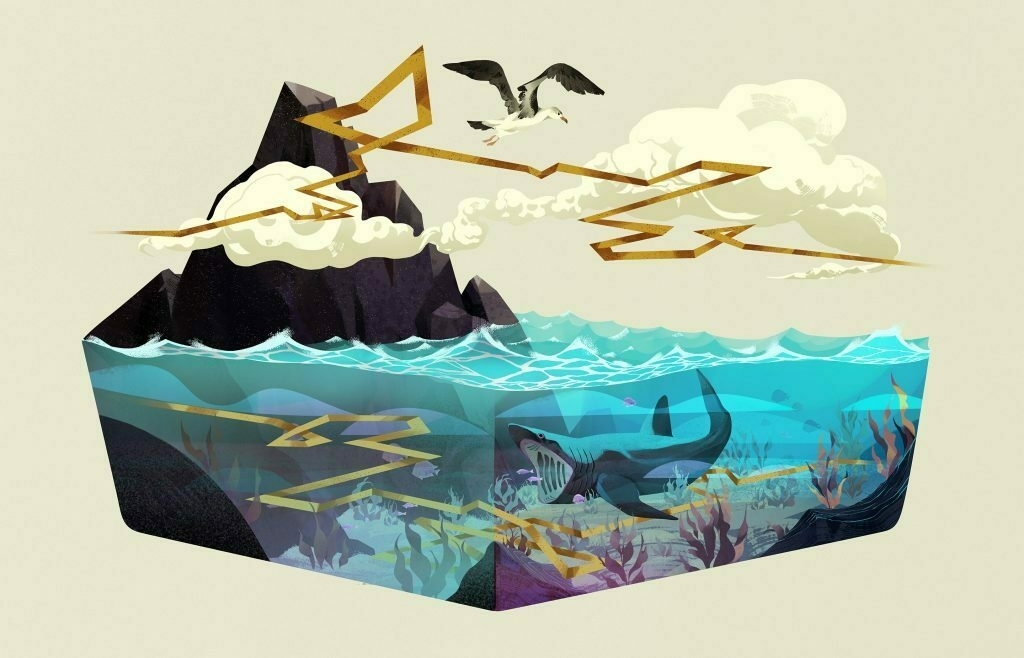
Random Search Wired Into Animals May Help Them Hunt
Lévy walks are now seen as a movement pattern that a nervous system can produce in the absence of useful sensory or mnemonic information, when it is an animal’s most advantageous search strategy. Of course, many animals may never employ a Lévy walk: If a polar bear can smell a seal, or a cheetah can see a gazelle, the animals are unlikely to engage in a random search strategy. “We expect the adaptation for Lévy walks to have appeared only where they confer practical advantages,” Viswanathan said.
Liam Drew (QUanta Magazine)
If you've watched wildlife documentaries, you probably know about Lévy walks (or 'flights'). This longish article gives a fascinating insight into the origin of the theory and how it can be useful in protecting different species.
A plan to turn the atmosphere into one, enormous sensor
One of AtmoSense’s first goals will be to locate and study phenomena at or close to Earth’s surface—storms, earthquakes, volcanic eruptions, mining operations and “mountain waves”, which are winds associated with mountain ranges. The aim is to see if atmospheric sensing can outperform existing methods: seismographs for earthquakes, Doppler weather radar for storms and so on.
The Economist
This sounds potentially game-changing. I can see the positives, but I wonder what the negatives will be?
Paths of desire: lockdown has lent a new twist to the trails we leave behind
Desire paths aren’t anything new – the term has been traced back to the French philosopher Gaston Bachelard, who wrote of “lignes de désir” in his 1958 book The Poetics of Space. Nature author Robert Macfarlane has written more recently about the inherent poetry of the paths. In his 2012 book The Old Ways: A Journey on Foot, Macfarlane calls them “elective easements” and says: “Paths are human; they are traces of our relationships.” Desire paths have been created by enthusiastic dogs in back gardens, by superstitious humans avoiding scaffolding and by students seeking shortcuts to class. Yet while illicit trails may have marked the easier (ie shorter) route for centuries, the pandemic has turned them into physical markers of our distance. Desire paths are no longer about making life easier for ourselves, but about preserving life for everyone.
Amelia Tait (The Guardian)
I've used desire paths as a metaphor many times in presentations and workshops over the last decade. This is an article that specifically talks about how they've sprung up during the pandemic.
Header image by Hans Braxmeier
Saturday shiftings
I think this is the latest I've published my weekly roundup of links. That's partly because of an epic family walk we did today, but also because of work, and because of the length and quality of the things I bookmarked to come back to...
Enjoy!

FC97: Portal Economics
Most of us are still trapped in the mental coordinates of a world that isn’t waiting for us on the other side. You can see this in the language journalists are still using. The coronavirus is a ‘strategic surprise’ and we’re still very much in the ‘fog of war,’ dealing with the equivalent of an ‘alien invasion’ or an ‘unexpected asteroid strike.’ As I said back in March though, this is not a natural disaster, like an earthquake, a one-off event from which we can rebuild. It’s not a war or a financial crisis either. There are deaths, but no combatants, no physical resources have been destroyed, and there was no initial market crash, although obviously the markets are now reacting.
The crisis is of the entire system we’ve built. In another article, I described this as the bio-political straitjacket. We can’t reopen our economies, because if we do then more people will die. We can’t keep them closed either, because our entire way of life is built on growth, and without it, everything collapses. We can give up our civil liberties, submitting to more surveillance and control, but as Amartya Sen would say, what good is a society if the cost of our health and livelihoods is our hard fought for freedoms?
Gus Hurvey (Future Crunch)
This is an incredible read, and if you click through to anything this week to sit down and consume with your favourite beverage, I highly recommend this one.
Coronavirus shows us it’s time to rethink everything. Let's start with education
There’s nothing radical about the things we’re learning: it’s a matter of emphasis more than content – of centralising what is most important. Now, perhaps, we have an opportunity to rethink the entire basis of education. As local authorities in Scotland point out, outdoor learning could be the best means of getting children back to school, as it permits physical distancing. It lends itself to re-engagement with the living world. But, despite years of research demonstrating its many benefits, the funding for outdoor education and adventure learning has been cut to almost nothing.
George Monbiot (The Guardian)
To some extent, this is Monbiot using a different stick to bang the same drum, but he certainly has a point about the most important things to be teaching our young people as their future begins to look a lot different to ours.
The Machine Pauses
In 1909, following a watershed era of technological progress, but preceding the industrialized massacres of the Somme and Verdun, E.M. Forster imagined, in “The Machine Stops,” a future society in which the entirety of lived experience is administered by a kind of mechanical demiurge. The story is the perfect allegory for the moment, owing not least to its account of a society-wide sudden stop and its eerily prescient description of isolated lives experienced wholly through screens.
Stuart Whatley (The Hedgehog Review)
No, I didn't know what a 'demiurge' was either. Apparently, it's "an artisan-like figure responsible for fashioning and maintaining the physical universe".
This article, which not only quote E.M. Forster, but also Heidegger and Nathaniel Hawthorne, discusses whether we really should be allowing technology to dictate the momentum of society.
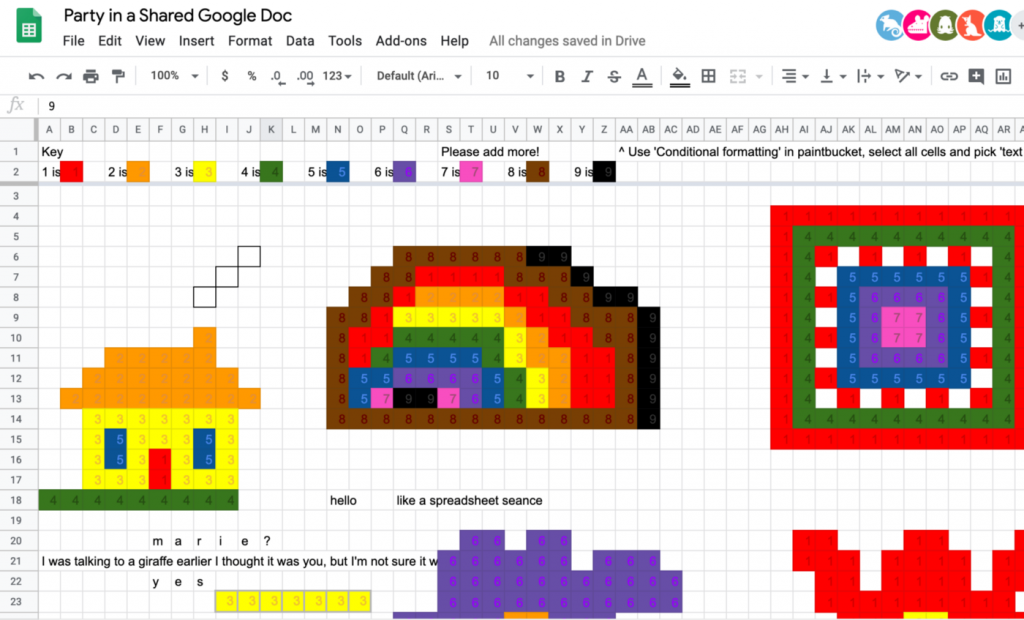
Party in a Shared Google Doc
The party has no communal chat log. Whilst I can enable edit permissions for those with the party link, shared google docs don’t not allow for chat between anonymous animals. Instead conversations are typed in cells. There are too many animals to keep track of who is who. I stop and type to someone in a nearby cell. My cursor is blue, theirs is orange. I have no idea if they are a close friend or a total stranger. How do you hold yourself and what do you say to someone when personal context is totally stripped away?
Marie Foulston
I love this so much.
Being messy when everything is clean
[T]o put it another way, people whose working lives can be mediated through technology — conducted from bedrooms and kitchen tables via Teams or Slack, email and video calls — are at much less risk. In fact, our laptops and smartphones might almost be said to be saving our lives. This is an unintended consequence of remote working, but it is certainly a new reality that needs to be confronted and understood.
And many people who can work from a laptop are also less likely to lose their jobs than people who work in the service and hospitality industries, especially those who have well-developed professional networks and high social capital. According to The Economist, this group are having a much better lockdown than most — homeschooling notwithstanding. But then, they probably also had a more comfortable life beforehand.
Rachel Coldicutt (Glimmers)
This post, "a scrapbook of links and questions that explore how civil society might be in a digital world," is a really interesting look at the physicality of our increasingly-digital world and how the messiness of human life is being 'cleaned up' by technology.
Remote work worsens inequality by mostly helping high-income earners
Given its potential benefits, telecommuting is an attractive option to many. Studies have shown a substantial number of workers would even agree to a lower salary for a job that would allow them to work from home. The appeal of remote work can be especially strong during times of crisis, but also exists under more normal circumstances.
The ongoing crisis therefore amplifies inequalities when it comes to financial and work-life balance benefits. If there’s a broader future adoption of telecommuting, a likely result of the current situation, that would still mean a large portion of the working population, many of them low-income workers, would be disadvantaged
Georges A. Tanguay & Ugo Lachapelle (The Conversation)
There's some interesting graphs included in this Canadian study of remote work. While I've written plenty about remote work before, I don't think I've really touched on how much it reinforces white, middle-class, male privilege.
The BBC has an article entitled Why are some people better at working from home than others? which suggests that succeeding and/or flourishing in a remote work situation is down to the individual, rather than the context. The truth is, it's almost always easier to be a man in a work environement — remote, or otherwise. This is something we need to change.

A first look at Unreal Engine 5
We’ve just released a first look at Unreal Engine 5. One of our goals in this next generation is to achieve photorealism on par with movie CG and real life, and put it within practical reach of development teams of all sizes through highly productive tools and content libraries.
I remember showing my late grandmother FIFA 18 and her not being able to tell the difference between it and the football she watched regularly on the television.
Even if you're not a gamer, you'll find this video incredible. It shows how, from early next year, cinematic-quality experiences will be within grasp of even small development teams.
Grand illusion: how the pandemic exposed we're all just pretending
Our pretending we’re not drowning is the proof we have that we might still be worth saving. Our performing stability is one of the few ways that we hope we might navigate the narrow avenues that might still get us out.
A thing, though, about perpetuating misperceptions, about pretending – because you’re busy surviving, because you can’t stop playing the rigged game on the off-chance somehow that you might outsmart it, because you can’t help but feel like your circumstances must somehow be your fault – is that it makes it that much harder for any individual within the group to tell the truth.
Lynn Steger Strong (The Guardian)
Wouldn't be amazing if we collectively turned to one another, recognised our collective desire not to play 'the game' any more, and decided to go after those who have rigged the system against us?
How to improve your walking technique
What research shows is that how we walk, our gait mechanics, isn’t as “natural” as we might believe. We learn to walk by observing our parents and the world around us. As we grow up, we embody the patterns we see. These can limit the full potential of our gait. Some of us unconsciouly prevent the pelvis and arms from swinging because of cultural taboos that frown upon having a gait as being, for example, too free.
Suunto
My late, great, friend Dai Barnes was a barefoot runner. He used to talk a lot about how people walk and run incorrectly, partly because of the 'unnatural' cushioning of their feet. This article gives some advice on improving your walking gait, which I tried out today on a long family walk.
Header mage via xkcd
Saturday sandcastles
The photos of brutalist sandcastles accompanying this week's link roundup made me both smile and really miss care-free walks on the beach. Although technically we're still allowed to visit the coast, our local council has closed nearby car parks.
This week I've been busy, busy, but managed to squeeze in a bit of non-fiction reading, the best of which I'm sharing below. Oh, and one link that I can' really quote is UnblockIt which was shared via our team chat this week. If your ISP filters certain sites, you might want to bookmark it...
There will be no 'back to normal'
In this article, we summarise and synthesise various - often opposing - views about how the world might change. Clearly, these are speculative; no-one knows what the future will look like. But we do know that crises invariably prompt deep and unexpected shifts, so that those anticipating a return to pre-pandemic normality may be shocked to find that many of the previous systems, structures, norms and jobs have disappeared and will not return.
Nesta
I'm going to return to this article time and again, as it breaks down in a really helpful way what's likely to happen post-pandemic in the following areas: political, economic, sociocultural, technological, legal, and environmental.
Plan for 5 years of lockdown
I’m attempting to be pragmatic. I think this is one of those times where we should hope for the best but plan for the worst. Crucially, I think that a terrifying number of people are in denial about the timescales of disruption that Covid-19 will cause, and this is causing them to make horrible personal and professional decisions. I believe that we have a responsibility to consider any reasonably likely worst case scenario, and take appropriate steps to mitigate it. But to do that we have to be honest about the worst case.
Patrick Gleeson
It's hard to disagree with the points made in this post, especially as the scenario planning that universities are doing seems to point in the same direction. Having said that, I don't think 'lockdown' will mean the same thing everywhere and at each stage of the pandemic.
'Will coronavirus change our attitudes to death? Quite the opposite'
For centuries, people used religion as a defence mechanism, believing that they would exist for ever in the afterlife. Now people sometimes switch to using science as an alternative defence mechanism, believing that doctors will always save them, and that they will live for ever in their apartment. We need a balanced approach here. We should trust science to deal with epidemics, but we should still shoulder the burden of dealing with our individual mortality and transience.
The present crisis might indeed make many individuals more aware of the impermanent nature of human life and human achievements. Nevertheless, our modern civilisation as a whole will most probably go in the opposite direction. Reminded of its fragility, it will react by building stronger defences. When the present crisis is over, I don’t expect we will see a significant increase in the budgets of philosophy departments. But I bet we will see a massive increase in the budgets of medical schools and healthcare systems.
Yuval Noah Harari
Some amazing writing, as ever, by Harari, who argues that, because our secular societies focus on the here and now rather than the afterlife, science has almost become a religion.

A startup debt to talk about more: emotional debt
We incur emotional debt whenever there’s an experience we’ve had, but not fully digested in all aspects of it. In my trauma therapy training I learned that this is in fact a natural and important human survival skill. Imagine you’re living in a pre-historic village and it gets raided by a neighboring tribe. Although no one gets killed, a number of houses have been burned down and food has been stolen. The next morning the most important tasks for everyone are to protect the village again, rebuild the houses and hunt for food to survive. Many of the villagers will have been deeply traumatized from the fears and terror they experienced in their bodies. Since food and shelter takes first priority to humans, not processing these emotions for now is a debt that’s necessary and important to incur. We can put it aside and leave it stuck in our bodies, ready to reengage and digest it later. It’s a great survival feature if you will.
A couple of weeks later when everything has been rebuilt, there might be a chance for the local shaman to offer a ritual around the fireplace where everyone can gather and re-experience the emotions that were too difficult to deal with at the actual event of the raid: the rage and anger towards the attackers, the fear and the terror over their lives and eventually the grief for the loss of their goods and most importantly their safety. Once that has been felt and integrated, everyone is able to move on and the night of the village raid can safely go into the history books, fairy tales and heroes journey accounts that luckily everyone survived, yet learned from.
Leo Widrich
While this is framed in terms of startups, I think every organisation has 'emotional debt' that they have to deal with. I like this framing, and will be using it from now on to explain why teams need times of compression and decompression (instead of never-ending 'sprints').
Don’t let remote leadership bring out the worst in you
Recognize that the pressure you apply is a reaction to a construct of control. You think you can control people – and things – and the reality is you can’t. The quicker you can realize this, the sooner you can shift to a frame of mind where you can focus constructively on the things that actually help your team, such as: (1) Making it clear why the work matters (2) Creating milestones to help that person achieve that work (3) Giving as much context as possible so they can make the best decisions (4) Helping them think through tough problems they encounter.
Claire Lew
I've led a remote team for a couple of years now, and worked remotely for six years before that. Despite this, it's easy to fall into bad habits, so this is a useful article to remind all leaders (most of whom are remote now!) that the amount of time someone spends on something does not equate to progress made.
Google Apple Contact Tracing (GACT): a wolf in sheep’s clothes.
But the bigger picture is this: it creates a platform for contact tracing that works all across the globe for most modern smart phones (Android Marshmallow and up, and iOS 13 capable devices) across both OS platforms. Unless appropriate safeguards are in place (including, but not limited to, the design of the system as described above – we will discuss this more below) this would create a global mass-surveillance system that would reliably track who has been in contact with whom, at what time and for how long. (And where, if GPS is used to record the location.) GACT works much more reliably and extensively than any other system based on either GPS or mobile phone location data (based on cell towers) would be able to (under normal conditions). I want to stress this point because some people have responded to this threat saying that this is something companies like Google (using their GPS and WiFi names based location history tool) can already do for years. This is not the case. This type of contact tracing really brings it to another level.
Jaap-Henk Hoepman
This, by a professor in the Netherlands who focuses on 'privacy by design' is why I'm really concerned about the Google/Apple Contact Tracing (GACT) programme. It's only likely to be of marginal help in fighting the virus, but sets up a global surveillance network for decades to come.

In this Zombie Apocalypse, your Homework is due at 5pm
Year in and year out, when school’s in, children know that they are to be at certain places at certain times, doing particular tasks in particular ways. And now, weeks loom ahead where they are faced with many of the same tasks, absent of all the pomp and circumstance. This is the ultimate zombie apocalypse nightmare—a pandemic has hit the world with a mighty force, schools and tuition centers are shut, and homework is still due. Children are adaptable creatures, but it will be challenging for many, if not most, to do all that they are expected to do under these altered conditions.
Youyenn Teo
I was attracted to this article by its great title, but it's actually an interesting insight into both education in a Singaporean context and the gendered nature of care in our societies.
Free Money for Surfers: A Genealogy of the Idea of Universal Basic Income
As cash transfers are increasingly seen as the ideal way to confront the magnitude of the coronavirus threat, it is unclear whether our political imagination is truly up to the task. The current crisis might accelerate rather than decrease our dependency on the market, strengthening capital’s grip on society. Large-scale public works are evidently unfeasible with physical distancing. But, with a clear medical equipment shortage and lacking trained personnel, there is obvious space for public planning responses, and “production for use value” seems ever more necessary. None of these ills will be solved by cash transfers.
Anton Jäger & Daniel Zamora
This, in the Los Angeles Review of Books, considers a new work by Peter Sloman entitled The Idea of a Guaranteed Income and the Politics of Redistribution in Modern Britain. Having previously been cautiously optimistic about Universal Basic Income (or 'cash transfers') I'm not so sure it would all work out so well. I'd rather we funded things like the NHS, but then that might be my white male privilege speaking.
How we made the Keep Calm and Carry On poster
I first found the poster in 2000, folded up at the bottom of a box of books we had bought at an auction. I liked it straight away and showed it to my wife Mary – she had it framed and put up in the shop. The next thing we found was that customers wanted to buy it. I suggested we make copies but Mary said: “No, it’ll spoil the purity.” She went away for a week’s holiday, so I secretly got 500 copies made.
Stuart Manley (interviewed by malcolm jack)
This ridiculously-famous poster was discovered in a wonderful second-hand bookshop not too far away from us, and which we visit several times per year. I love the story behind it.
Images via The Guardian: For one tide only: modernist sandcastles – in pictures

